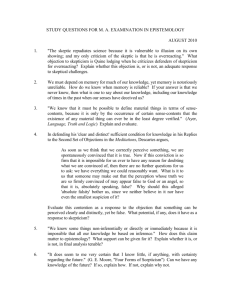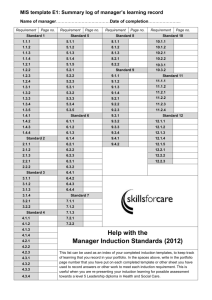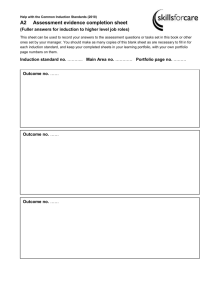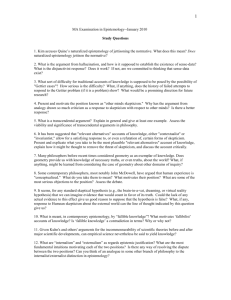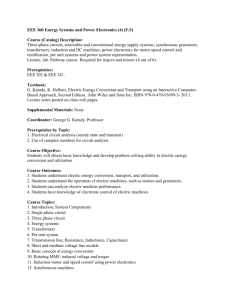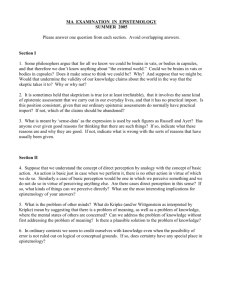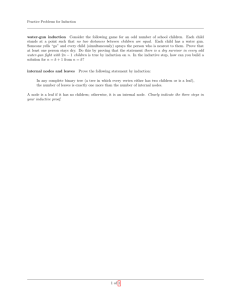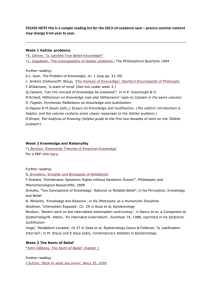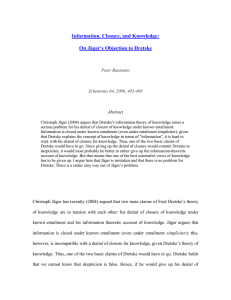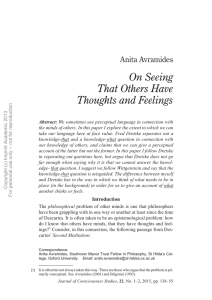Philosophy 102 syllabus
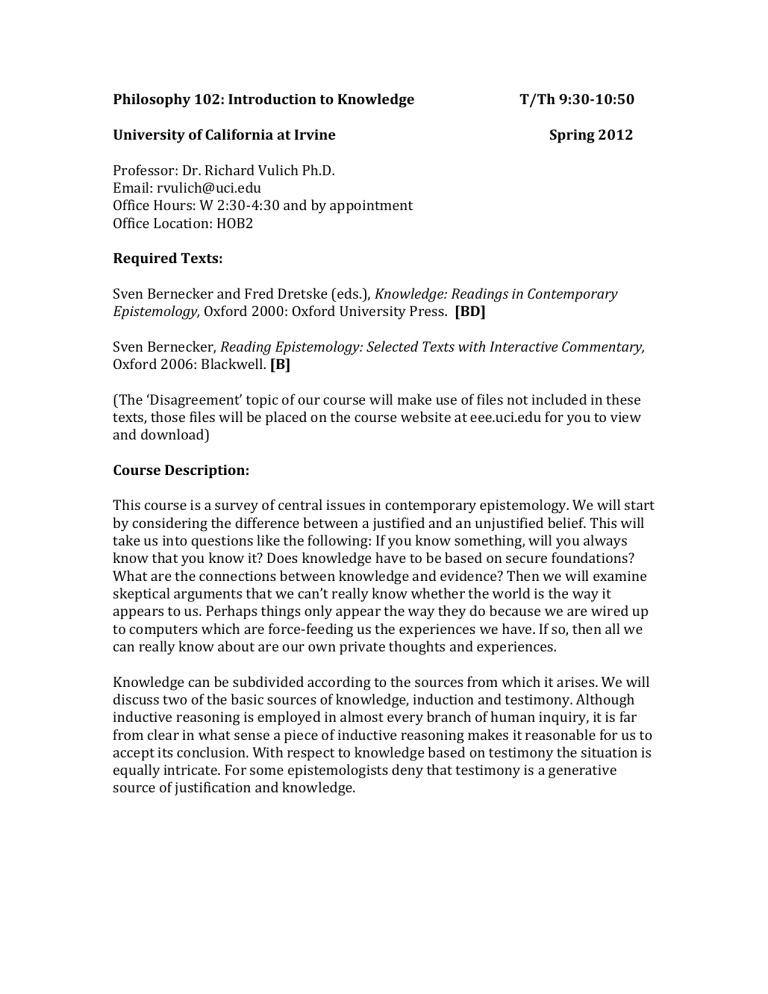
Philosophy 102: Introduction to Knowledge
University of California at Irvine
Professor: Dr. Richard Vulich Ph.D.
T/Th 9:30-10:50
Spring 2012
Email: rvulich@uci.edu
Office Hours: W 2:30-4:30 and by appointment
Office Location: HOB2
Required Texts:
Sven Bernecker and Fred Dretske (eds.), Knowledge: Readings in Contemporary
Epistemology, Oxford 2000: Oxford University Press. [BD]
Sven Bernecker, Reading Epistemology: Selected Texts with Interactive Commentary,
Oxford 2006: Blackwell. [B]
(The ‘Disagreement’ topic of our course will make use of files not included in these texts, those files will be placed on the course website at eee.uci.edu for you to view and download)
Course Description:
This course is a survey of central issues in contemporary epistemology. We will start by considering the difference between a justified and an unjustified belief. This will take us into questions like the following: If you know something, will you always know that you know it? Does knowledge have to be based on secure foundations?
What are the connections between knowledge and evidence? Then we will examine skeptical arguments that we can’t really know whether the world is the way it appears to us. Perhaps things only appear the way they do because we are wired up to computers which are force-feeding us the experiences we have. If so, then all we can really know about are our own private thoughts and experiences.
Knowledge can be subdivided according to the sources from which it arises. We will discuss two of the basic sources of knowledge, induction and testimony. Although inductive reasoning is employed in almost every branch of human inquiry, it is far from clear in what sense a piece of inductive reasoning makes it reasonable for us to accept its conclusion. With respect to knowledge based on testimony the situation is equally intricate. For some epistemologists deny that testimony is a generative source of justification and knowledge.
Work and Attendance Requirements:
You should read an average of about 40 pages of difficult primary text per lecture, participate in the lectures and sit both a midterm and final exam. You are expected to have studied the readings. It is of essential importance that you should attend all lectures.
Assessment Criteria:
The final grade will be determined as follows: 10% for attendance at and active participation in lecture, 40% for the midterm exam, and 50% for the final exam.
Course Schedule
Topic One: The Analysis of Knowledge
Wk 1: 4/3 Introduction
4/5 Edmund Gettier, “Is Justified True Belief Knowledge?” (BD, ch.2)
Wk 2: 4/10 Keith Lehrer & Thomas Paxson, “Knowledge: Undefeated Justified True
Belief” (BD, ch.5)
Alvin Goldman, “The Causal Theory of Knowing” (BD, ch. 4)
4/12 David Armstong, “The Thermometer-Model of Knowledge” (BD, ch.7)
Wk 3: 4/17 Robert Nozick, “Conditions for Knowledge” (B, ch.1.2)
4/19 Alvin Goldman, “Discrimination and Perceptual Knowledge” (BD, ch. 8)
Alvin Goldman, “What is Justified Belief?” (B, ch.2.1)
Wk 4: 4/24 Laurence Bonjour, “Externalist Theories of Empirical Knowledge”
(BD, ch.14)
Richard Foley, “What’s Wrong With Reliabilism?” (B, ch.2.2)
4//26 Matthias Steup, “A Defense of Internalism” (B, ch.3.1)
Wk 5: 5/1 William Alston, “An Internalist Externalism” (BD, ch.16)
Ernest Sosa, “Reliabilism and Intellectual Virtue” (B, ch.3.2)
5/3 MIDTERM EXAMINATION
Topic Two: The Structure of the Body of Knowledge
Wk 6: 5/8 Roderick Chisholm, “The Directly Evident” (BD, ch.18)
William Sellars “Does Empirical Knowledge Have a Foundation?” (BD,
ch.19)
5/10 William Alston, “Two Types of Foundationalism” (B, ch.5.1)
Laurence Bonjour, “The Coherence Theory of Empirical Knowledge”
Topic Three: Sources of Knowledge
(B, ch.5.2)
Wk 7: 5/15 (Perception) H.P. Grice, “The Causal Theory of Perception” (BD, ch.30)
Peter Strawson, “Perception and it’s Objects” (BD, ch.31)
5/17 (Disagreement) Thomas Kelley, “The Epistemic Significance of
Disagreement” (on eee)
Richard Vulich, “Peer-Hood” (on eee)
Wk 8: 5/22 (Testimony) Elizabeth Fricker, “Against Gullibility” (B, ch.4.1)
Tyler Burge, “Content Preservation” (B, ch.4.2)
5/24 (Induction) Bertrand Russell, “On Induction” (BD, ch.37)
Hans Reichenbach, “The Pragmatic Justification of
Induction” (BD, ch.38)
Nelson Goodman, “The New Riddle of Induction” (BD,ch.39)
Topic Four: Responses to Skepticism
Wk 9: 5/29 Peter Unger, “A Defense of Skepticism” (BD, ch.23)
Barry Stroud, “Understanding Human Knowledge in General” (BD,
ch.22)
5/31 Robert Nozick, “Knowledge and Skepticism” (BD, ch 25, pp.354-65)
Fred Dretske, “The Pragmatic Dimension to Knowledge” (B, ch.6.1)
Wk 10: 6/5 Hilary Putman, “Brains in Vats” (BD, ch.27)
6/7 Review Session
Wk 11: FINAL EXAM JUNE 14 th 8-10am
